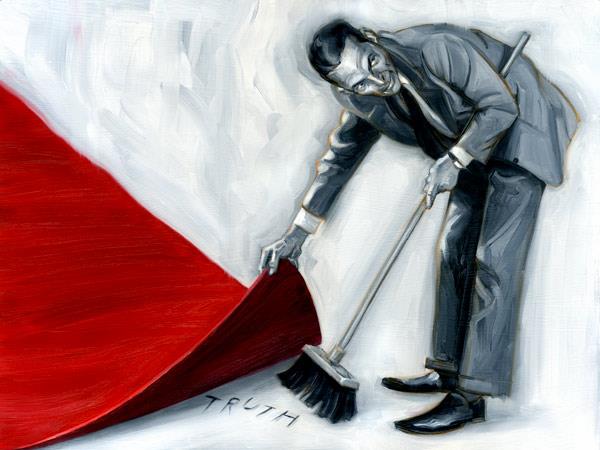For the government corruption files... Do you remember the not-so-big-deal legislation known as the 2012 STOCK Act?
That's STOCK as in Stop Trading on Congressional Knowledge.
Members of the House and Senate passed this act - which in this case should be short for acting like whores - quietly because it pointed to Congress as a bed of lascivious insiders who trade for personal gain through the backroom market-moving horse trading that they massage into laws in D.C.
Of course, our Congress of paid pimps and panderers intended the STOCK Act to show everyone that they were willing to make a law to make sure they wouldn't do what they said they weren't doing.
Well, it looks like they may be doing it anyway.
 Last year, under the cover of darkness, a Senate investigation looked into whether Mark Hayes, a top Senate aide on healthcare matters, broke any protocols (aka laws) when he apparently "predicted" in an e-mail to Height Securities (a "policy research firm"... wink, wink) that there was about to be some Medicare-related stuff coming down the pike that would move some insurance stocks.
Last year, under the cover of darkness, a Senate investigation looked into whether Mark Hayes, a top Senate aide on healthcare matters, broke any protocols (aka laws) when he apparently "predicted" in an e-mail to Height Securities (a "policy research firm"... wink, wink) that there was about to be some Medicare-related stuff coming down the pike that would move some insurance stocks.
Hayes is now a lobbyist - of course.
This kerfuffle happened in the Senate and was investigated within the Senate by Senate investigators. Can you guess what happened?
Well, I'm about to tell you ...
Inaction Figures
Nothing happened. Senate investigators don't carry guns - they carry brooms. That's why there are lovely rugs scattered all over the Senate - perfect for sweeping things under.
Fast forward to today.
The Justice Department, the U.S. Securities and Exchange Commission, and a grand jury under the auspices of the U.S. District Court for the Southern District of New York - that's Wall Street's home court - want to talk to members of the House Committee on Ways and Means and Brian Sutter, staff director of the committee's healthcare subpanel.
And you'll never guess about what.
It looks like - and I'm saying it "looks like" because things aren't always as they appear - the civil and criminal probes imply Trading on Congressional Knowledge.
If you are the cynical type, and you're thinking nothing is going to come of this because nothing came of the Senate investigation, but you have a glimmer of hope because this isn't a House rug investigation but is being looked into by the Justice Department and the SEC... I'm sorry to blow your hopes.
It's not that I'm cynical, but members of the House don't really have to answer to the Justice Department if they don't want to. And they certainly don't have to answer to those pesky regulatory peeping toms at the SEC.
It's about separation of powers.
Personally, I'd love to see the Justice Department do something right, besides openly extort money for the Treasury and federal and state agencies from in-their-crosshairs crooked banks. Maybe they'll exercise some muscle, not that Attorney General Eric Holder has any. But if there are Republicans to go after, he'll start flexing what he's got, like the IRS did going after Tea Party Republicans.
But maybe not... after all, there are Democrats on the Ways and Means Committee, too.
As for the SEC, forget their muscle. They'll be threatened with budget cuts if they delve too deeply into insider trading in Congress.
Now that I'm writing this, I'm wondering where I'm going with it. After all, the whole corrupt mess isn't going anywhere anyway, except for under a rug somewhere.
Just thought you'd like to know... for what it's worth.
More on corruption and scams from Shah Gilani: The public has been hoodwinked by central banks and governments into thinking deflation is bad, when in fact it's a healthy corrective counterbalancing of excesses that build up in free-market economies. Here's the truth about deflation - and how the fearmongers are really screwing us over...
About the Author
Shah Gilani boasts a financial pedigree unlike any other. He ran his first hedge fund in 1982 from his seat on the floor of the Chicago Board of Options Exchange. When options on the Standard & Poor's 100 began trading on March 11, 1983, Shah worked in "the pit" as a market maker.
The work he did laid the foundation for what would later become the VIX - to this day one of the most widely used indicators worldwide. After leaving Chicago to run the futures and options division of the British banking giant Lloyd's TSB, Shah moved up to Roosevelt & Cross Inc., an old-line New York boutique firm. There he originated and ran a packaged fixed-income trading desk, and established that company's "listed" and OTC trading desks.
Shah founded a second hedge fund in 1999, which he ran until 2003.
Shah's vast network of contacts includes the biggest players on Wall Street and in international finance. These contacts give him the real story - when others only get what the investment banks want them to see.
Today, as editor of Hyperdrive Portfolio, Shah presents his legion of subscribers with massive profit opportunities that result from paradigm shifts in the way we work, play, and live.
Shah is a frequent guest on CNBC, Forbes, and MarketWatch, and you can catch him every week on Fox Business's Varney & Co.



